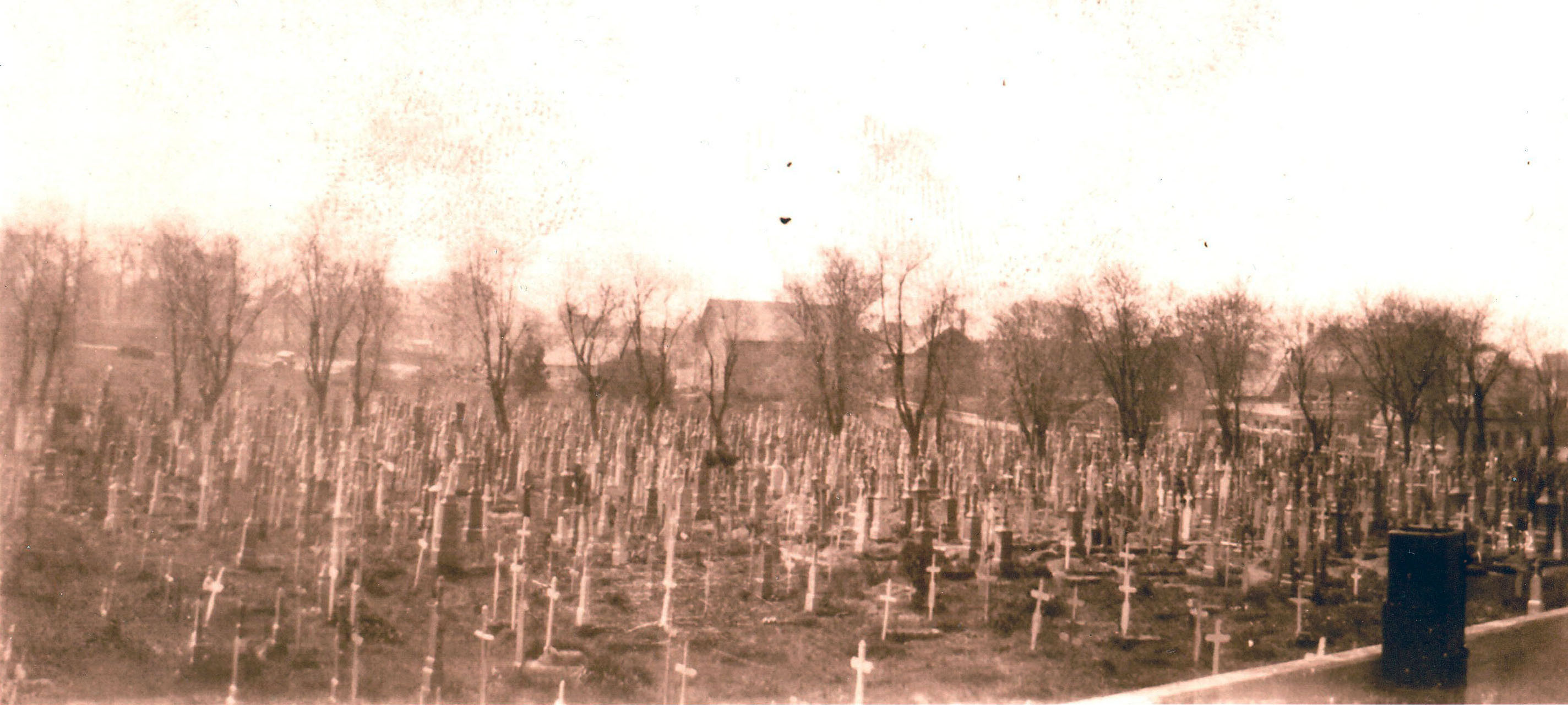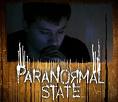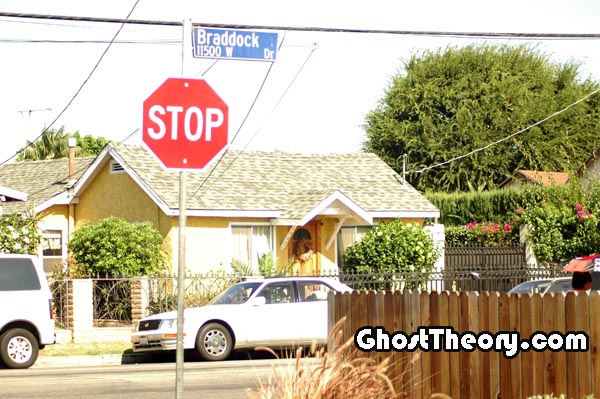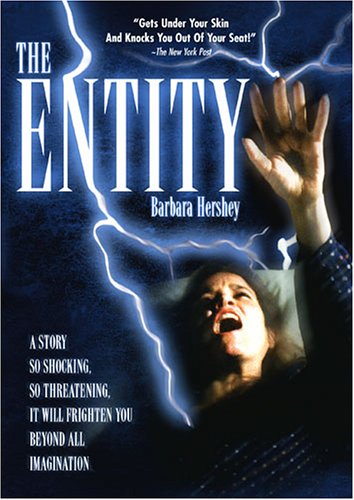A cold darkness permeated Brooklyn’s east side one night in 1894. Under a bright moonlight, the cobblestone streets glistened as a thick fog poured over them. A fog that made its way down the hills surrounding Brooklyn’s Ward 27. An area surrounded by cemeteries that were almost as old as the dark, wet dirt that fills them.
On these empty streets, five young women found themselves ankle-deep in a coiling fog. In a hurry, they decided to cut across an empty lot near Knickerbocker Avenue. As the ladies made their way through the lot, something made them stop dead in their tracks. Something white up ahead. The wafting fog grew more and more as the women shivered together. Just then, a hysterical cry ripped through the fog, sending a bolt of lightning down their chilled spines.
Before any of them could move, much less utter a word, the white blob got closer and soon they were able to make out the ghastly image through the fog. A sunken-faced woman, covered in a white garb wading through the dark night’s fog. The five of them ran the other direction and got to the safety of their homes in one breath.
Upon hearing their terrifying ordeal, the women’s brothers all gathered near the lot of the incident. They were armed to the bone and ready to confront the ghostly apparition. The young men found themselves huddled together, backs against each other, in a barren lot near what is now Bushwick Avenue in Brooklyn. It was well past midnight as one of the men pointed his shaking revolver at the ground in front of them. Under what remained of the bright glow of the moon, they saw the apparition rise from 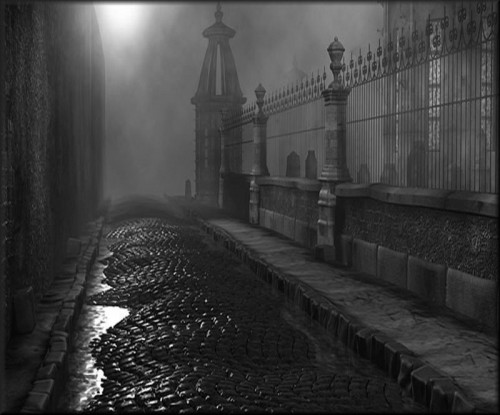 the earth, reaching its long, boney arms for the cowering group of men. Like their sisters, the men ran off to the safety of their homes. Only to tell of their horrifying ordeal to neighbors and friends as the sun rose, and the dark and foggy streets clambered with the living once more.
the earth, reaching its long, boney arms for the cowering group of men. Like their sisters, the men ran off to the safety of their homes. Only to tell of their horrifying ordeal to neighbors and friends as the sun rose, and the dark and foggy streets clambered with the living once more.
The following night, as the story unfolded across Brooklyn, a large group of 200 concerned residents and spectators gathered near the lot of the incident. The pitchfork mob waited and waited through the long and cold night but nothing came. They grew impatient as the night grew longer and more silent. They dispersed soon after and went home feeling that they’ve been fooled.
The following night, a man named Peter Woelfel set out to dispel the claims that a ghost lurks the 27th Ward. Peter, a skeptical man set out late at night only to return back home just past 1 A.M. Witnesses say that Peter had returned white as the ghost herself. He was visibly traumatized by something he encountered on an empty lot between Irving Avenue and Knickerbocker Avenue.
Peter goes on to tell them how he was crossing the empty lot when he was confronted by the ghostly woman. He was paralyzed in fear, unable to flee. According to the story, the ghost “…performed the serpentine dance while he remained rooted to the ground.” Peter then went on to say that he was only able to move once the ghost gave out blood-curling wail before vanishing into thin air.
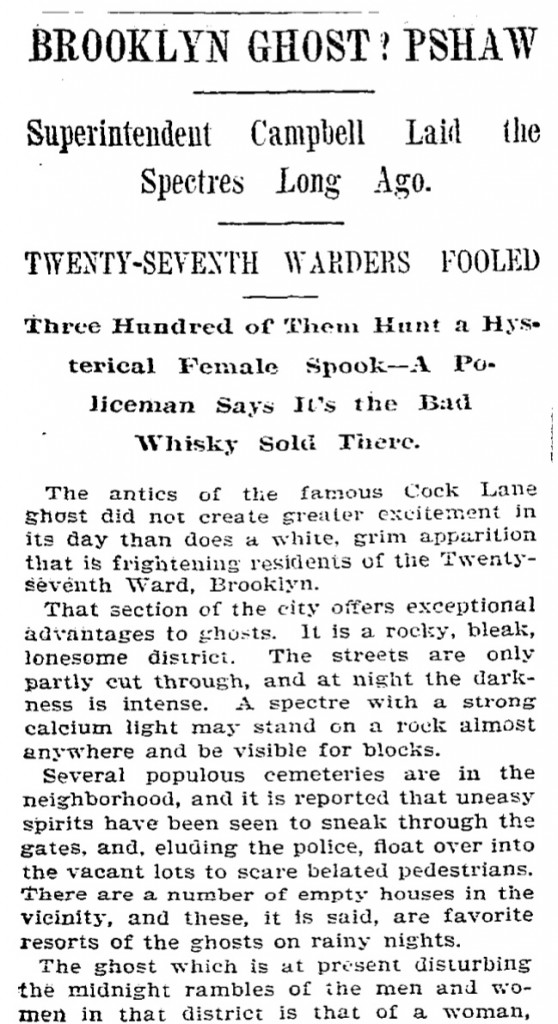 It was Peter’s story that incited the mob once more. For the following night a larger crowd had gathered to catch a glimpse of the supposed ghostly apparition in Brooklyn. However the fog was so thick at night that one could hardly see a few feet in front of them. The mob once more disbanded and headed home in disappointment. They did agree to meet once more after the fog lifted, until then, they were to ask the local police for a hand in the matter.
It was Peter’s story that incited the mob once more. For the following night a larger crowd had gathered to catch a glimpse of the supposed ghostly apparition in Brooklyn. However the fog was so thick at night that one could hardly see a few feet in front of them. The mob once more disbanded and headed home in disappointment. They did agree to meet once more after the fog lifted, until then, they were to ask the local police for a hand in the matter.
The 20th precinct got the word about the ghostly figure and more important to them, the 300 or so potential marauders. Captain Kitzer sent along a squad of his men and a patrol wagon to ‘catch the ghost’.
By then a reporter for The New York Times went out to the scene only to find hundreds of armed men searching for the supposed specter. They carried revolvers, axes, swords, and someone even worse a full armored suit ( as a joke). However amidst the chaos and spectacle, no ghostly image was ever seen. The reporter interviewed policeman Holliday who was in charge that night.
“I’ll tell you something on the quiet,” Holliday said. “I don’t believe in these here ghost stories. If there’s ghosts around, why haven’t I seen them?” the reporter nod in agreement. “I’ll tell you what I think it is.” Holliday continued. “I think it’s the whisky. The worst whisky that’s sold on the island is sold right here in the twentieth. I’ve known men, after drinking it, to go home and rob their own houses. And it will make a man see almost anything – ghosts, snakes, or anything else. I’m disgusted with this ghost business. It makes me sick. At the same time, if a ghost comes I’ll run it in.”
The ghostly woman failed to appear that night and the large crowd had finally began to fizzle down. The reported would later write a short article about the incident, mainly chalking it up to excitement and craze caused by bad whisky. However the few terror-stricken people who encountered the wailing ghost would never forget that frightful foggy night in the streets of Brooklyn.
Based on the 1894 New York Times article ‘Brooklyn Ghost? PSHAW‘
1 comment
